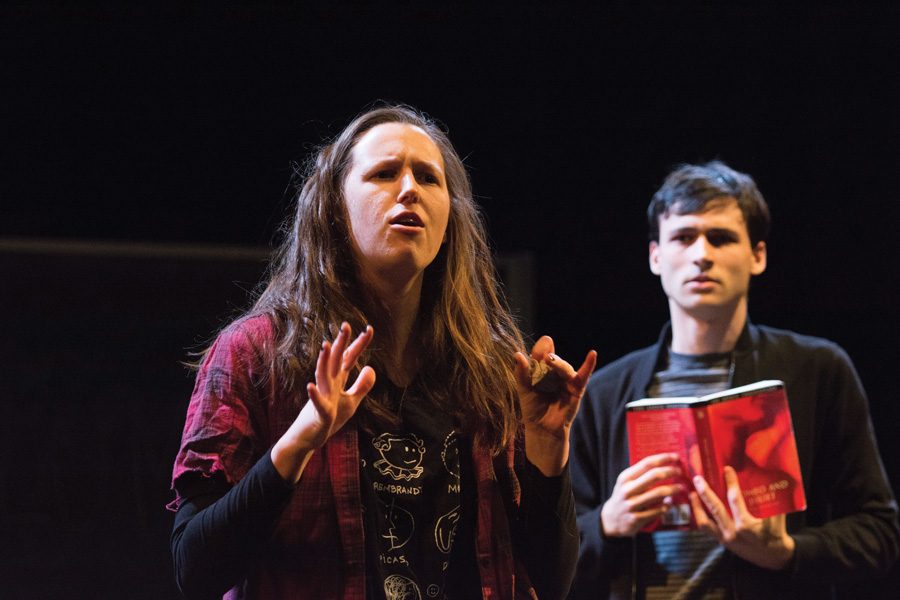‘Columbinus’ play addresses gun violence, adolescent mental health
Claire Pak/The Daily Northwestern
In “Columbinus: A Struble Project,” actors revisit the 1999 shooting at Columbine High School and portray stereotypical high school archetypes such as Rebel (pictured), Jock and Loner. The play emphasizes the importance of monitoring mental health and social isolation in adolescents.
February 16, 2017
A play about the Columbine High School shooting, presented by Northwestern Students for Gun Violence Prevention, will portray the tragedy to examine the circumstances that led to the shooting.
“Columbinus,” which opens Friday in the Mussetter-Struble Theater, advocates for gun regulation and analyzes the social and psychological pressures high school students face. The production is based on the 1999 shooting, in which two teenagers opened fire at their Columbine High School in Colorado, killing 13 people and injuring 20 before committing suicide. There are theories that the perpetrators of the shooting were social outcasts who had been bullied.
In the play, each character is given an archetypal name that defines a stereotype of a high school student, such as “Prep,” “Jock” and “AP.” The perpetrators of the shooting go by “Loner” and “Freak.”
“You see the two characters that are the perpetrators go through this social isolation, this feeling of complete detachment from the world around them,” Communication senior Courtney Doyle said. “Regulation can only do so much, but we as a society need to step up our game with monitoring mental health and social isolation.”
Communication senior Abby Weissman, director of “Columbinus,” said the cast has spent a lot of time trying to figure out how to temper their own judgment of the characters.
“The big idea of the play is about being able to look at the people who are next to you and recognize what they’re going through,” Weissman said. “It explores the dichotomy of what people think of you and what you actually are.”
Doyle called Weissman’s commitment to the project “awe-inspiring.” She said the play is an opportunity for the club to put on a production that will draw the theater community and other groups on campus that are political or social-justice minded.
Doyle, who has been a member of Northwestern Students for Gun Violence Prevention since her freshman year, said though the group is small — it has fewer than 10 members — she hopes “Columbinus” will bring more attention to gun violence issues.
“It was all kind of a whirlwind that felt like it might not ever actually happen,” Doyle said, “but it’s come together and it’s actually been quite miraculous. I’m so proud of it.”
In the past, Northwestern Students for Gun Violence Prevention has invited guest speakers and shown movie screenings. There will be free admission to “Columbinus” because it is a Struble Project. However, all donations will go to Everytown for Gun Violence Prevention — a national organization that is fighting to end gun violence and increase safety in communities.
An open conversation about the audience’s reactions to the show will follow the final performance of “Columbinus.” The conversation will be led by members of Northwestern Students for Gun Violence Prevention and Steve Tarzia, a Knight Lab fellow and founder of gunmemorial.org. The website, which serves as a bank of information and virtual memorial for victims of gun violence, was created in an effort to make victims more than just a statistic, Tarzia said.
Communication sophomore Christopher Lanham, who plays a student in the show, said there isn’t one particular message to the play.
“The script is so raw and works so well because it doesn’t try and say anything except for, ‘Here’s what happened,’” he said. “Columbinus’ lets you look at it from an objective angle, to see these kids and see what they went through, to see what caused this.”
Email: [email protected]
Twitter: @jenniferhepp97


